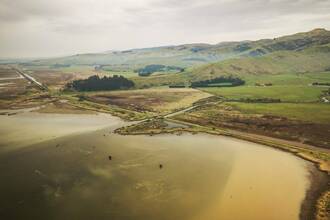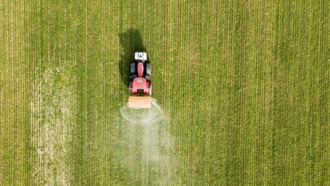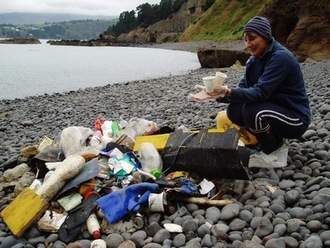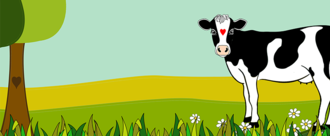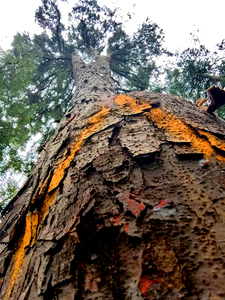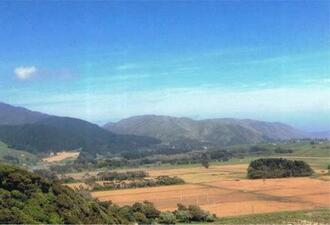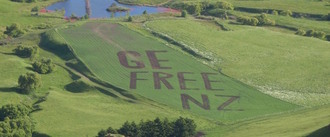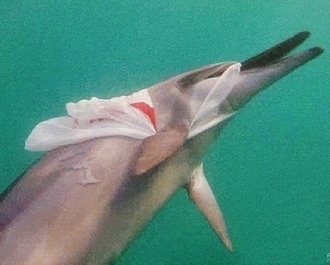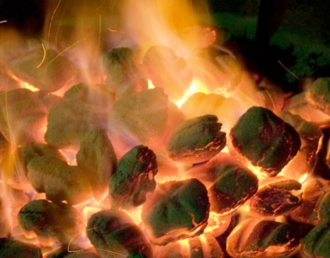-
Phase out synthetic nitrogen fertiliser - SouthlandSynthetic nitrogenous fertiliser should be banned because: 🌏 It pollutes our rivers and lakes 🌏 It is responsible for the growth of intensive, unsustainable farming 🌏 It causes the release of nitrous oxide, one of the worst greenhouse gases 🌏 It is a likely cause of bowel cancer 🌏 It is degrading the natural health of our soils Everyone deserves safe drinking water and clean rivers to swim in. But too many cows, and too much chemical fertiliser, are rapidly polluting the rivers, lakes and drinking water we should all be able to enjoy and rely on. The agriculture sector is currently Aotearoa New Zealand’s biggest polluter, causing 48% of all our greenhouse gas emissions, and overloading our rivers with synthetic nitrogen in the form of nitrates (nitrogen). Southland’s cow numbers have increased by 16 times since 1990, from 38,000 to 636,000 and according to Stats NZ we have nationally increased the tonnes of nitrogen fertiliser applied to farmland per annum by 629 per cent from 1991 to now (from 62,000 tonnes to 452,000 tonnes). Our once clean rivers and lakes are increasingly polluted. Our once-safe drinking water is being contaminated. A 2019 report found nitrate was the contaminant with the highest risk ranking in Southland’s groundwater. Growing research is showing a strong link between nitrate in drinking water and babies being born underweight or prematurely.(1,2) Chronic exposure is associated with formation of carcinogenic nitroso compounds in the gastrointestinal tract. Chronic exposure through drinking water containing > 0.88 mg/L (as nitrate-N) has recently been linked to colorectal cancers. (1,2) It’s shocking that Southland has to build a Charity Hospital to deal with the large number of colonoscopies needed by people from across Murihiku Southland which the current Southland Hospital does not have the capacity to deal with. Synthetic nitrogenous fertiliser is mostly sold here by just two companies; Ravensdown and Ballance have industrial dairying as their biggest customer by far. A transition away from industrial livestock farming and mass milk production is required. It starts with an urgent ban on synthetic nitrogenous fertiliser, and a nationwide shift to more plant-based regenerative organic farming. Our Regional Council has the responsibility for environmental management, monitoring, enforcement and compliance, and has the power to end synthetic nitrogenous fertiliser use. Join the call! Add your name today to demand our Councillors cut synthetic nitrogenous fertiliser. Also you can request free nitrate testing for private bores if you wish to have peace of mind that your own water supply is safe: https://petition.act.greenpeace.org.nz/agriculture-nitrate-testing-request References 1 - Link between nitrate levels and premature births, study finds, 2021 https://bit.ly/3vacKKK 2 - Human health risks associated with contaminants in Southland waters, 2019 https://bit.ly/3sjB5f2 3 - Report: The hidden killer, 2019. How synthetic nitrogen fertiliser is fuelling intensive dairying, polluting our rivers and climate. https://www.greenpeace.org/static/planet4-aotearoa-stateless/2019/09/8130950a-greenpeace-synthetic-nitrogen-fertiliser-briefing.pdf146 of 200 SignaturesCreated by Jenny, Dave and Robina
-
Moratorium on helipad consents for Aotea / Great BarrierThe Aotea community is greatly concerned about the recent increase in helipad applications for Aotea, and the fact the Hauraki Gulf Islands District Plan “specifically envisions helipad activity” and provides a planning pathway for new consents. Our island is a precious ecological sanctuary; people live and visit here to experience a different pace and way of life. The potential proliferation of helicopters runs counter to this, and to the wairua of Aotea. Whilst we fully support and value the vital medical helicopter flights that service the island, we take issue with private, non-essential helicopter flights. They are an intrusive source of noise and pollution and are driving division in our normally tight-knit community. We call for a halt to all consent approvals, while a longer-term solution to this problem is found; one which protects our island’s peace, ecology and world-leading night skies, along with the climate.419 of 500 SignaturesCreated by Scotty Witherow
-
Stop the proposed cattle feedlots in Te Waihora (Lake Ellesmere) - Ōtautahi★ 16 June 2022: The Little River ECO-Collective gathered in front of ECAN, the head offices of Environment Canterbury in Christchurch, to present the 2 petitions huge 2000-cattle feed barn with well over 3000 signatures. Green MP Eugenie Sage and Labour MP Tracey McLellan will attend the event in support. Please continue to help build the pressure to put this issue on the agenda. Write to ECAN to express your concern about the lack of appropriate action – ask ECan to make the Wongan Hills feedlot application ‘publicly notifiable’, and involve us in the decision making: email Chief Executive of ECan: [email protected] ★ Te Waihora (Lake Ellesmere) is the largest lake in Canterbury/Waitaha and one of the most important wetland habitats in New Zealand, providing homes for numerous birds, plants and invertebrates. Yet it’s also heavily polluted from the runoff of surrounding farms with some of the country’s highest concentrations of sediment, nitrogen and phosphorus. Over-allocation of water to irrigation schemes contributes to the problem. It could get much worse with a proposal for industrial farms and thousands of cattle right on its shores. Christchurch City Council has granted consent for company Wongan Hills to build two 200m-long indoor barns, or feedlots, holding up to 1000 steers each, raised for beef, in Kaituna Valley, Banks Peninsula. The sheds breach several district plan rules, including those for maximum building footprint which is meant to be 300m². The barns and buildings will cover 24,330m². These proposed feedlots to be installed on Te Waihora land are utterly unacceptable. The lake already suffers enormously from pollution from current farming practices. Feedlots are a style of intensive indoor farming that is focused on increased production from animals, in larger numbers, in smaller spaces. Feedlots risk spreading disease and the huge amounts of waste pollute waterways, soil and plant life. Animal farming is responsible for a large part of New Zealand’s greenhouse gas emissions and these intensive feedlots do not align with the way Aotearoa should be responding to the current climate crisis. This kind of intensive farming has no place in Aotearoa, and especially Canterbury. We should be moving to regenerative and organic agricultural systems that work with the environment, not against it. We strongly oppose this and call on the Council to throw it out immediately. There should be no chance of a consent from Environment Canterbury. [Image: Stuff] Controversial farmer’s next venture: A feedlot https://www.newsroom.co.nz/pro/controversial-farmers-next-venture-a-feedlot Whakaora Te Waihora https://ngaitahu.iwi.nz/environment/te-waihora/whakaora-te-waihora/ Land, air, water Aotearoa - Te Waihora/Lake Ellesmere water quality https://www.lawa.org.nz/explore-data/canterbury-region/lakes/te-waihoralake-ellesmere/#:~:text=Average%20water%20quality.,Mesotrophic%20lake%20conditions. How to fix Te Waihora/Lake Ellesmere https://www.nzgeo.com/stories/how-to-fix-te-waihora-lake-ellesmere/ Why you should give a damn about feedlots https://thespinoff.co.nz/food/23-08-2018/why-you-should-give-a-damn-about-feedlots2,086 of 3,000 SignaturesCreated by Annelies Pekelharing
-
Cut synthetic nitrogen fertiliserTogether we are facing enormous challenges to our local ecosystems and climate. Our food production systems need to be resilient and sustainable to guarantee a long term future. Everyone deserves to swim in clean rivers and have safe drinking water. But too many cows and too much chemical fertiliser is rapidly polluting the rivers, lakes and drinking water we should all be able to enjoy and rely on. The agriculture sector is currently Aotearoa New Zealand’s biggest polluter, causing 48% of all our greenhouse gas emissions, and overloading our rivers with nitrate nitrogen. Synthetic nitrogen fertiliser is the key ingredient that has intensified agriculture in Aotearoa, in particular dairy farming. Since 1990, dairy cow numbers have doubled. The addition of synthetic nitrogen fertiliser on the land has increased seven-fold. Dairy farmers spread synthetic nitrogen fertiliser onto farmland in vast quantities because in the short term it’s an easy way to make grass and other crops grow fast. Synthetic nitrogen fertiliser is a double whammy for the climate. Its use enables increasing numbers of cows on the land, which increases methane gas emissions from burps, and more nitrous oxide emissions from manure and urine. Nitrous oxide is one of the most dangerous greenhouse gases. It’s 265 times worse for trapping heat in the atmosphere than carbon dioxide. Synthetic nitrogen fertiliser is mostly sold here by just two companies; Ravensdown and Ballance and industrial dairying is their biggest customer by far. Besides our climate, our once clean rivers and lakes are increasingly polluted. When nitrogen gets into rivers and lakes it can cause algal blooms which can suck all the oxygen out of the water, suffocating fish and other species. Our once-safe drinking water is becoming contaminated. Entire freshwater ecosystems are being pushed past breaking point. We are on the brink of losing native freshwater species forever. A transition away from industrial livestock farming and mass milk production is required. It starts with an urgent ban on synthetic nitrogen fertiliser, and a nationwide shift to more plant-based regenerative organic farming. Regenerative organic farming is a way of growing food that works with nature. Instead of using synthetic nitrogen regenerative farmers use nitrogen fixing plants and put their effort into building healthy soil. They farm a diverse mix of crop and animal varieties, and use methods like cover cropping, inter-cropping, agro-forestry, and no-till techniques. Together, we can move towards regenerative organic farming. But first, we need to starve Big Ag of its key ingredient. The Government has set new rules for fresh water which limit the amount of nitrogen fertiliser farmers can use, but still leave the limit too high. Our Regional Council has the responsibility for environmental management, monitoring, enforcement and compliance, and has the power to cut synthetic nitrogen fertiliser use. Join the call! Add your name today to demand our Councillors cut synthetic nitrogen fertiliser. https://www.instagram.com/cutsnfcanterbury/ Report: The hidden killer, 2019. How synthetic nitrogen fertiliser is fuelling intensive dairying, polluting our rivers and climate. https://www.greenpeace.org/static/planet4-aotearoa-stateless/2019/09/8130950a-greenpeace-synthetic-nitrogen-fertiliser-briefing.pdf Agriculture emissions and climate change 2021 https://environment.govt.nz/guides/agriculture-emissions-climate-change/ Why New Zealand has to cut synthetic nitrogen fertiliser https://www.youtube.com/watch?v=arc73-E5W9M The Regenerators https://www.youtube.com/watch?v=OKMM2b6srIg1,460 of 2,000 SignaturesCreated by Krysta Neve
-
Make Otautahi-Christchurch one-use plastic-bag freeSamoa and 29 other countries have banned them...now it's time for our redesigned city Otautahi-Christchurch to lead the way in NZ. New Zealanders send an estimated one BILLION plastic bags to landfill annually. Scientists estimate it takes 1000 years (yes, you read that right) for plastic bags to degrade and during that process toxins are leached and particles can get into the food chain.2,135 of 3,000 SignaturesCreated by Megan Blakie

-
Give cows a life worth livingThere are over six million dairy cows in New Zealand. They are literally everywhere across our landscape as farming has intensified. A more sustainable future that is kinder for cows and truly gives them a good life, a life worth living, must include a transition to more plant-based regenerative agriculture, and that's better for the planet too. Our animal welfare laws establish animal sentience as a basis for how we treat farmed animals.(1) This means we recognise cows feel pain. They think, have physical and social wants and needs, including food, water and shelter, and the company of (cow) friends and family, just like us. They are peaceful, generous herbivores but we’re exploiting them for profit. Our laws also recognise the need for 'a good life for cows' as a basic measure of welfare. This means they must have food and shelter. But they also need, and deserve, 'a life worth living' - with friendship, enrichment – a variety and things of interest, and ‘positive affective states’ - happiness, too.(2) Yet dairy cows have anything but a good life and a life worth living.(3) Since the 1990s the dairy industry has squeezed cows more closely together for higher production. Cows are exposed to the harsh weather because shelterbelts were removed to fit in more cows. Intensive winter grazing can see cows crammed in at two per metre (!) and forced to sleep and give birth in mud.(4) All calves are taken from their mothers at around four days old, and around two million of them are killed outright either at the slaughterhouse or on-farm. At least a quarter of the herd is also 'replaced' - killed, every year. And that's mostly for milk, butter and other dairy products, 96% of which get sent overseas. We make so much money from cows in Aotearoa, we're living on the cows' back. The least we can do is ensure they have lives worth living in this Code of Welfare review. Ultimately, cows deserve to live in a world in intact family units where they are not exploited and killed for their bodily products. We have the power to shape a genuinely good life for cows and ensure they have a life worth living, in the 2022 Government review of the dairy cow Code of Welfare. Let’s do it. [1] Animal sentience: https://www.mpi.govt.nz/animals/animal-welfare/national-animal-welfare-advisory-committee/animal-sentience-their-emotions-feelings-and-experiences-of-life/ (2) https://www.ncbi.nlm.nih.gov/pmc/articles/PMC4810049/ (3) https://www.stuff.co.nz/business/farming/125319128/animal-welfare-complaints-increasing-in-dairy-industry (4) https://www.mpi.govt.nz/dmsdocument/38210/direct375 of 400 SignaturesCreated by Christine Rose
-
Save the Paturoa KauriAt a time when our forest is losing Kauri trees to Kauri dieback disease, we need to do all we can to save the healthy trees to protect this endemic species. I am not anti-development, however, the developer could move the intended building and protect these trees. The RMA was never designed to allow developers to be able to destroy trees that have significant ecological value. The RMA legislation has loopholes that will destroy our forests if change does not happen.28,006 of 30,000 SignaturesCreated by Toko

-
Stop the aerial spraying of harmful herbicides in QE ParkThe World Health Organisation's research arm, the IARC, has declared glyphosate a probable carcinogen. Glyphosate has been linked to tumours in mice and rats — and there is also what the IARC classifies as ‘mechanistic evidence’, such as DNA damage to human cells from exposure to glyphosate. The poison is being dropped by helicopters, the boundary of which is the newly built cycle path, only a few meters from residents properties. Poison was dropped early on labour day, breathed in by residents opening their front doors, as well as onto people in the park. Residents, growers, pony clubs and concerned human beings are worried for our children, our food, our water, our birds and animals.1,098 of 2,000 SignaturesCreated by Peter Brooking

-
Stand by your pledge to protect GM Free RegionsThe current Minister has made quite clear that he will use those new powers to quash regional GM free food-producing zones, even though they are backed by communities, using legitimate planning processes. Auckland, Far North, Whangarei and Hastings councils' have all exercised their current rights under the RMA to create GM free food-producing zones. The zones are community-driven by tangata whenua and pākehā working together to secure these protections for our whenua, our kai and our people. As you know, they cover what is grown on the land and farmed. They are not about medicines or cancer vaccines, which will continue to be regulated exclusively by national health authorities. Other regional initiatives that protect communities and local environments would also be under the gun – particularly protections around fracking and other mining activities. Do not lend your names or that of the Māori Party to this bid to undermine the rights of our communities. These powers should not be the law of our lands. You can protect our ability to shape the futures we want for our people and land. Stand by us; defend local democracy. Do not support 360D or 43A(3A), in any form.1,933 of 2,000 SignaturesCreated by Soil & Health Association

-
New Countdown, No PlasticSingle-use disposable plastic bags are not recycled and although often reused, they pollute and poison the marine and land environment and negatively impact human and animal health. The ingestion of plastic in the Hauraki Gulf and beyond seriously threatens turtles, whales, sea birds and myriad other creatures. Plastic bags take several hundred years to break down leaving microscopic pieces of highly toxic plastic in the environment as they fissure. Toxicity from plastic components has been scientifically linked to metabolic disorders and threats to fertility in humans and sea creatures. Stopping the use of single-use disposable plastic bags is a relatively easy way we can make a positive difference.1,035 of 2,000 SignaturesCreated by Jennifer Fountain

-
Opoho “enviro” school put your words into action and stop burning coal!Coal is the worst fossil fuel to burn for greenhouse gasses. It emits twice the carbon dioxide as natural gas for the same amount of energy produced. These dioxides, namely nitrogen oxides, sulphur dioxide, and mercury can potentially lead to health implications ranging from asthma, lung cancer and heart disease to compromising intellectual capacities. Opoho School is marketing itself as having one of the highest standards of Enviroschools in New Zealand. It, however, burns between 12 to 14 tonnes of coal a year. Its environmental practices are contributing almost 40 tonnes of carbon dioxide annually to an already over-polluted atmosphere. The burning of coal is antithetical to any school’s mission. For an Enviroschool like Opoho School, its actions are hypocritical, unconscionable and should not be tolerated. What is the use of a school if you haven't got a tolerable planet to put it on? Will you allow your children to study in this polluted environment? Sign this petition today and stop the coal burning! http://opohoschool.iwarp.com/cgi/wp/?page_id=6123 of 200 SignaturesCreated by Ralph Adler

-
Block the Offer - Continue to say no to deep sea oil drillingWe ask that the Christchurch City Council continue to advocate for both current and future generations by holding their position of opposition to Deep Sea Oil prospecting and drilling. Oil companies have been given the right to prospect for oil around the coast of Canterbury. Consultations about Deep Sea Oil permits are with Iwi, Hapu and Local Authorities. There are many concerns about Deep Sea Oil prospecting and drilling. The seismic surveying used to identify resources in the sea bed is known to be harmful, even fatal, to marine life and to mammals such as whales and dolphins in particular. This is especially of concern to the Canterbury region, as the Banks Peninsula Marine Mammal Sanctuary is incredibly close to the areas included in the Block Offer. If oil is found and drilling starts there will be significant risks to our harbours and coastline. The wells would be significantly deeper than the one in the Gulf of Mexico, which took months to close off when there was an oil spill, and devastated the ecology and the economy of the coastal area. We must not let this happen here. The Rena disaster demonstrated how unprepared New Zealand is for a major oil spill. Peak Oil is already here so we have to switch to different ways of living anyway. It is prudent to use the resources which are available now to move towards alternatives. The effects of Climate Change are already being experienced and it is now fully accepted that we have to change our oil dependent lifestyles. The International Panel on Climate Change (IPCC) warned of ' irreversible and dangerous' changes to the climate if the use of fossil fuels continues. Climate scientists have indicated that we must act now to avoid catastrophic climate change. It is unjustifiable to risk environmental and ecosystem damage to search for a fuel that cannot be safely used without jeopardising the future. Oil production is not economically sustainable (extraction of a finite resource the use of which contributes to climate change could never be sustainable in any way) nor would oil production contribute at all to our local economy other than to have a potentially huge adverse impact if an accident did occur. Oil exploration, both in terms of the immediate risk of an oil spill but also in terms of the contribution to climate change, endangers fishing – customary, commercial or recreational. Oil exploration therefore risks our economy but also people's well being. For generations people have lived off the abundance of the sea, for Tangata Whenua this is especially important as the sea is their food basket. We ask that the Christchurch City Council advocate for the people and communities they serve by continuing to make a public statement of opposition to Deep Sea Oil exploration and that they express their opposition generally and on any occasion that they are consulted on this topic. We need to take real climate action now and say NO to deep water drilling.828 of 1,000 SignaturesCreated by Bridget White




